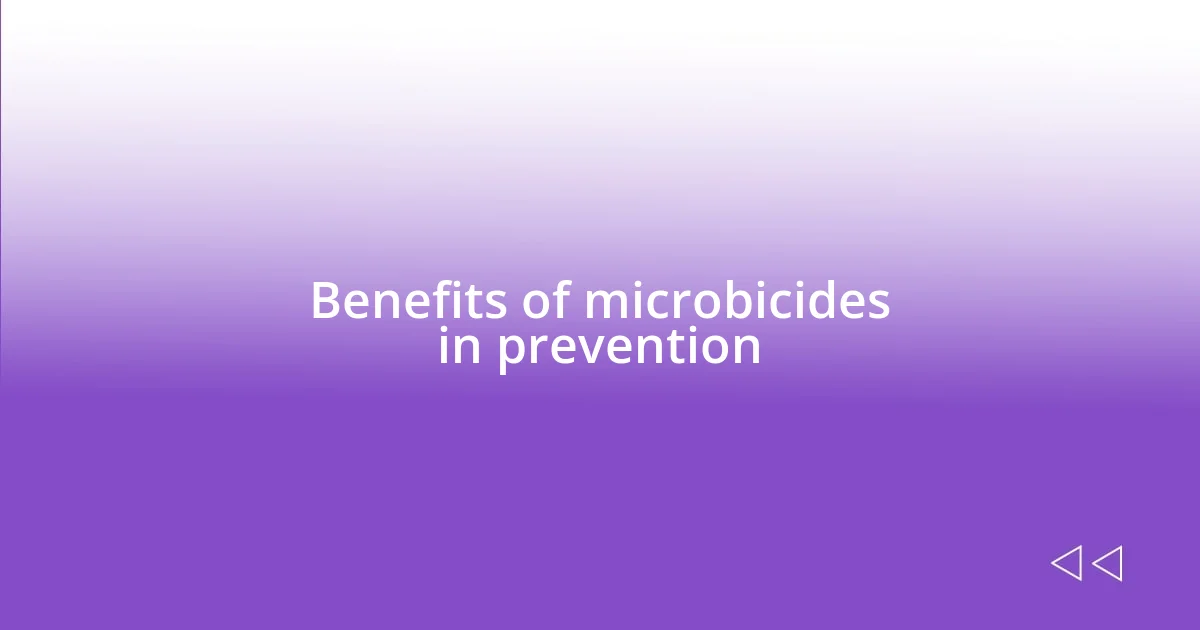Key takeaways:
- Microbicides offer various forms of STI and HIV protection, enhancing sexual health choices and empowering individuals to take control of their health.
- Effective sexual health protection fosters open communication between partners, reduces stigma around STIs, and contributes to overall relationship satisfaction.
- Future developments in microbicides include innovative delivery mechanisms and long-acting options, highlighting the importance of accessibility and ongoing research for equitable health solutions.

Understanding microbicides for health
Microbicides are intriguing compounds designed to prevent the transmission of sexually transmitted infections (STIs) and HIV when applied topically. I remember the first time I learned about them; it felt like discovering a new layer of protection that could empower individuals in their sexual health decisions. Have you ever thought about how much control we can reclaim over our own bodies with such innovations?
These products come in various forms, such as gels, creams, and films, and are designed to be used before sexual activity. I often reflect on the importance of choice in sexual health—having additional preventive measures can dramatically shift one’s confidence. Isn’t it empowering to know that scientific advancements are making strides toward that goal?
Microbicides not only play a crucial role in STI prevention but also enhance communication between partners. I’ve had pivotal conversations with friends about safe sex practices, where discussing microbicides opened doors to deeper discussions around trust and intimacy. When we equip ourselves with knowledge about such tools, how does it transform our relationships and experiences?

Importance of sexual health protection
Sexual health protection is fundamentally about safeguarding our well-being and ensuring that we can engage in intimate relationships without fear. I remember a time when a friend confided in me about feeling anxious before each encounter because of the risk of STIs. That vulnerability resonated with me, and it made me realize how essential it is to prioritize our health and the health of our partners. When we actively choose protective measures, we not only support ourselves but also respect our partners’ health and peace of mind.
Consider the following aspects of sexual health protection:
- It fosters open communication between partners, allowing for discussions about boundaries and health status.
- It reduces the stigma surrounding STIs, leading to more people seeking testing and treatment.
- It empowers individuals to take control of their sexual health by exploring different protective options, including microbicides.
- It contributes to overall relationship satisfaction by ensuring that intimacy can be enjoyed without fear.
Ultimately, prioritizing sexual health protection enhances not just individual well-being but also relationship dynamics, leading to deeper connections and trust.

Types of microbicides available
When exploring the types of microbicides available, it’s fascinating to see the advancements in formulations aimed at increasing effectiveness and ease of use. I remember the excitement I felt when I first learned about the range of options, from gels to suppositories. Each format offers its own unique benefits and can cater to different preferences, which I believe is essential in any sexual health strategy.
The specific categories of microbicides often highlight diverse active ingredients. For instance, some are designed with surfactants to disrupt the membranes of pathogens, while others use botanical extracts with antimicrobial properties. I once attended a health workshop where they demonstrated how these different types work. It was enlightening to see firsthand how these innovations could play a role in enhancing safety during sexual activity.
This understanding helped me recognize that not all microbicides are created equal, and personal preferences play a key role in choosing the right one. Factors like texture, ease of application, and the potential for irritation can significantly affect a user’s experience. I often reflect on how knowing what’s available empowered my decision-making—what will you choose to enhance your sexual health journey?
| Type | Description |
|---|---|
| Gels | A viscous form that is applied inside the vagina or rectum before intercourse, providing a slippery surface and antimicrobial effects. |
| Films | Thin sheets that dissolve upon contact with moisture, releasing active ingredients to prevent transmission. |
| Suppositories | Solid forms inserted into the vagina or rectum, where they dissolve to provide localized protection against infections. |
| Creams | Emollient formulations that can offer both lubrication and antimicrobial properties when applied prior to intercourse. |

How to use microbicides effectively
To use microbicides effectively, it’s vital to follow the application instructions carefully. I still recall the moment I applied a gel for the first time; I was a bit unsure and hesitant. Ensuring that the microbicide is used right before intercourse, as directed, can significantly enhance its efficacy—timing is everything. Have you ever experienced that moment of uncertainty in new experiences?
I remember one intimate encounter where I confidently discussed with my partner the importance of microbicides. It felt liberating to share responsibility for our sexual health, and I realized that doing so not only ensured protection but also built a deeper connection. When both partners are informed and engaged, it transforms the narrative from one of doubt to a partnership rooted in trust. Isn’t it empowering to know we have choices?
Keeping the microbicide in a convenient spot can also be a game-changer. I’ve found that integrating it into my routine—like keeping it near other personal care items—made it more accessible and less of a hassle. This small adjustment eliminated the awkwardness of searching for it in the heat of the moment. How do you ensure that your chosen methods are right at your fingertips when you need them?

Benefits of microbicides in prevention
The benefits of microbicides in preventing sexually transmitted infections (STIs) are profound. One specific advantage that stands out is the level of control it provides users. I distinctly remember the sense of empowerment I felt when I realized I could take proactive steps in my sexual health. This autonomy is crucial, especially for those who may not be comfortable negotiating condom use with partners.
Microbicides also reduce the risk of unintended pregnancies. In my experience, finding alternatives has been a game-changer. I once had a conversation with a friend who shared her journey of balancing contraception with sexual pleasure. Microbicides offered her a discreet option that didn’t compromise on enjoyment or safety, which is a win-win scenario for many.
One aspect that truly resonates with me is the ability for microbicides to fit seamlessly into different lifestyles. Whether it’s a busy schedule or spontaneous encounters, these products can be easily integrated into one’s routine. I can recall a time when I was on vacation and had a last-minute opportunity to get to know someone better. Having microbicides on hand alleviated concerns, allowing me to focus more on the moment rather than worry about safety. Can you imagine the freedom that comes with this kind of preparation?

Potential side effects of microbicides
Potential side effects of microbicides can vary, and it’s something that I personally considered before incorporating them into my routine. Some users report experiencing mild irritation or allergic reactions, which can be unsettling. I remember the first time I noticed a slight burning sensation after applying a microbicide; it made me pause and evaluate whether this was a typical reaction or something more serious. Have you ever been in a situation where a new product didn’t feel quite right?
While adverse effects are often mild, it’s essential to remain mindful. For instance, I once spoke with a friend who experienced unexpected vaginal dryness after regular use. Even though it was temporary for her, it sparked an important conversation about how our bodies can react differently to such products. Have you ever wondered how your body might respond to something new? Listening to your body is crucial, as it can guide you to make informed choices that align with your personal health needs.
Additionally, there’s always the concern of how these side effects can impact overall sexual enjoyment. I’ve had moments where I felt apprehensive about using a microbicide because of stories I’ve heard about discomfort. This led me to research and connect with others who shared their experiences, highlighting the importance of community in navigating new health products. How do you approach conversations about potential side effects with your loved ones? Sharing information not only helps ease anxiety but builds a strong support system for making informed decisions.

Future developments in microbicides
The future of microbicides looks promising, especially with innovations in formulation. I recently attended a seminar where researchers discussed new delivery mechanisms, such as gels or films that can enhance efficacy while ensuring comfort. Can you imagine a microbicide that not only protects against STIs but also complements the natural feel of intimacy? That idea resonates with me deeply—it feels like technology could truly elevate our experiences.
Moreover, the development of long-acting microbicides is generating excitement. There’s talk about biodegradable implants that could provide protection over extended periods, which is revolutionary. I recall a time when I was overwhelmed by the daily management of my sexual health options. The thought of having a single, longer-term solution without the constant reminders and applications is something that many of us would appreciate. Isn’t it refreshing to think about a future where we can focus on connection, rather than constant precautions?
Of course, ongoing research is critical in this space. I’ve seen firsthand how trial studies can lead to incredible advancements, but I also worry about access and equity. One of my friends, who lives in a low-income area, often expresses the challenges of obtaining health products. Making microbicides widely accessible and affordable should be a priority as we move forward. Have you considered the implications of availability on our collective sexual health? It’s a conversation we must continue, as it shapes the future of how we protect ourselves and each other.













